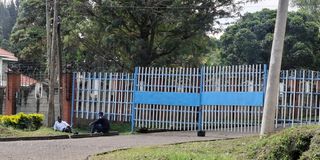How war memorial hospital incurs losses worth Sh 36million monthly, in dormant state

Two guards man the gate of war memorial hospital that has been dormant since 2023. Photo taken on September 9,2025.
A century-old hospital sits silent, adjacent to a functioning facility, near the residence of the most powerful man in the country. Yet none of this matters—it still remains closed.
For nearly two years, the Nakuru War Memorial has embodied a ghost story of power, law, and neglect after the county government forcibly took over the hospital’s management and land.
Officials claimed irregularities in the lease agreement that had allowed the War Memorial Hospital Limited to run the facility for decades.
On October 31, 2023, the Environment and Land Court issued an order stopping the takeover, but the county did not budge.
In January 2024, security officers sealed the gates, ordered out staff, and forced patients to seek care elsewhere, and the hospital was officially closed.
What followed was a barrage of court orders, all directing that the hospital be reopened and staff reinstated, with judges repeatedly ruling against the county government.
Police were instructed to enforce compliance. Yet the orders went largely ignored, prompting concern from the Chief Justice herself, who decried the disregard for judicial authority.
The stalemate stretched on until October 2024, when the Court of Appeal issued a decisive directive to reopen the hospital under a joint management committee.
Still, its reopening did not materialize, and piles of unpaid utility bills, estimated at more than Sh. 2.3 million, delayed basic preparations like reconnecting electricity and testing equipment.
Meanwhile, monthly losses mounted, about Sh. 36 million per month, pushing cumulative damage to over half a billion shillings.
Behind the legal back-and-forth, patients were forced back to the strenuous public health systems, with dozens of staff losing their jobs.
Amid this silence, Engineer Evans Kimori has launched an online petition to collect signatures with his plan to present it to the Senate, demanding that the facility be reopened in line with existing court orders.
Even with this, the fate of the hospital remains uncertain, and for Nakuru residents, the question that lingers is, how can a hospital adjacent to power, backed by the courts, and needed by thousands, remain a ghost of its former self?

